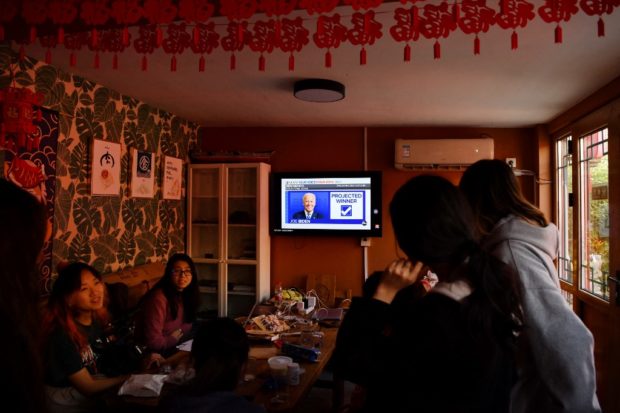US to let Chinese students start school year, easing COVID-19 rules

A group of Chinese students who study at US universities watch online live coverage of the US presidential election at an apartment in Beijing on November 4, 2020. Photo by GREG BAKER / AFP
WASHINGTON — The United States said Tuesday it was easing remaining Covid-19 restrictions on international students, giving the green light to Chinese nationals to start the school year at US universities.
The move responds to persistent demands from US universities, which increasingly rely financially on foreign students and count on China for more than one-third of them — far more than any country.
Secretary of State Antony Blinken said that students with valid visas from China, Iran, Brazil and South Africa would qualify for exemptions to entry bans in place over the past year due to concerns of Covid transmission.
The decision is “in keeping with the Department of State’s commitment to facilitate legitimate travel to the United States,” a statement said.
President Joe Biden’s administration in March similarly eased restrictions for students from the European Union and Britain.
Article continues after this advertisementUnder the latest exemption, students will need to have visas to attend universities for classes starting on August 1 or later, and cannot enter the United States more than one month beforehand.
Article continues after this advertisementAll travelers will still be subject to the US requirement to present a negative Covid test.
Foreign students — who generally pay full tuition — are a crucial revenue source for US universities, which have been hit hard as Covid forced much instruction to go online.
More than one million international students study in the United States each year. They contributed $45 billion to the US economy in 2018, according to the Commerce Department.
It remains to be seen if enrollment will be hit not only by Covid but by an increasingly tense atmosphere for Chinese students.
Former president Donald Trump ordered the expulsion of Chinese students who have ties to the military, fearing they will steal US knowhow, prompting concerns by some Asian-American activists that the entire community was being painted with a broad brush of suspicion.
The United States has seen a wave of hate crimes against people of Asian heritage, sometimes triggered by false association with Covid-19.
India and South Korea are the second and third largest sources of foreign students to the United States, and neither country faced blanket bans over Covid.
For more news about the novel coronavirus click here.
What you need to know about Coronavirus.
For more information on COVID-19, call the DOH Hotline: (02) 86517800 local 1149/1150.
The Inquirer Foundation supports our healthcare frontliners and is still accepting cash donations to be deposited at Banco de Oro (BDO) current account #007960018860 or donate through PayMaya using this link.